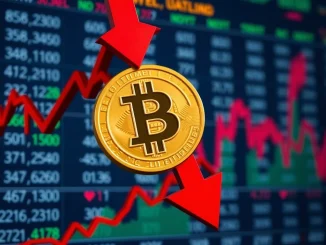
Hold onto your hats, crypto enthusiasts! The Turkish Lira has just taken a nosedive, plummeting to an all-time low against the US dollar. This financial earthquake in Turkey is sending shockwaves through the cryptocurrency market, specifically causing a massive spike in BTC/TRY trading on Binance. Let’s dive into what’s happening and what it means for the crypto world.
Why is the Turkish Lira Plunging?
The recent dramatic drop in the Turkish lira is attributed to growing political uncertainty in Turkey. Reports indicate that the lira fell sharply after the arrest of Istanbul Mayor Ekrem Imamoglu, a prominent political figure seen as a potential challenger to President Erdogan. According to CoinDesk, the lira weakened by a staggering 10% in a single day, hitting a record low of 41 against the U.S. dollar.
This isn’t an isolated incident. Turkey has been grappling with persistent currency depreciation for some time now. Several factors contribute to this ongoing economic challenge:
- High Inflation: Turkey has been battling soaring inflation rates, eroding the purchasing power of the lira.
- Unconventional Monetary Policy: The country’s central bank policies have sometimes deviated from conventional economic wisdom, contributing to investor uncertainty.
- Geopolitical Factors: Regional and international political dynamics can also exert pressure on the Turkish economy and its currency.
Bitcoin Trading Spikes on Binance: A Safe Haven?
In times of economic turmoil and currency devaluation, people often seek refuge in assets perceived as safe havens. And guess what? Cryptocurrency, particularly Bitcoin, is increasingly being viewed as one such alternative. As the Turkish lira took a tumble, traders on Binance Exchange reacted swiftly.
The data speaks for itself:
- Unprecedented Volume: Between 07:00 and 08:00 UTC, a whopping 93 BTC/TRY were traded on Binance.
- Yearly High: This hourly volume marks the highest in the past year, demonstrating the intensity of trading activity.
- Flight to Safety: This surge indicates that Turkish investors are likely turning to Bitcoin as a hedge against the declining value of their national currency.
This behavior isn’t entirely new. Historically, during periods of economic instability in various countries, we’ve seen similar patterns of increased cryptocurrency adoption and trading. When fiat currencies falter, the decentralized and limited-supply nature of Bitcoin becomes increasingly attractive.
BTC at a Discount? Exploring the Price Discrepancy
Interestingly, reports suggest that Bitcoin was trading at a slight discount on Binance compared to Coinbase during this period of heightened BTC/TRY trading. Why might this be the case?
One plausible explanation is capital flight. As the lira depreciates, Turkish traders might be converting their lira to Bitcoin and then rapidly moving those Bitcoin holdings into more stable, dollar-linked assets like USDT (Tether). This demand for USDT in exchange for BTC within the Turkish market could exert downward pressure on the BTC price on local exchanges like Binance, when compared to global platforms like Coinbase.
Think of it like this:
| Scenario | Possible Trader Action | Impact on BTC/TRY Price |
|---|---|---|
| Lira Devaluation | Convert TRY to BTC on Binance | Increased demand for BTC, potentially pushing price up (initially) |
| Seek Stable Value | Convert BTC (obtained with TRY) to USDT | Increased selling pressure on BTC for USDT, potentially moderating or lowering BTC price in TRY market compared to USD markets |
Turkey’s Crypto Connection: A Growing Trend
The current situation is not happening in a vacuum. Turkey economy has been facing persistent currency depreciation, and this has been a catalyst for increased interest in alternative assets. Beyond cryptocurrencies, hard assets like gold have also seen increased demand in Turkey.
For Turkish citizens, the appeal of cryptocurrencies stems from several factors:
- Hedge Against Inflation: Bitcoin’s limited supply (21 million coins) is often touted as an inflation hedge, unlike fiat currencies which can be printed more freely.
- Decentralization: Cryptocurrencies operate outside the control of central banks and governments, offering a degree of financial autonomy.
- Accessibility: In countries with capital controls or restrictions, cryptocurrencies can provide a more accessible way to store and move value.
Actionable Insights: What Does This Mean for You?
While the Turkish Lira’s woes might seem geographically distant, they offer valuable lessons for anyone involved in the cryptocurrency space:
- Global Interconnectedness: The crypto market is global. Economic events in one country can ripple through the entire ecosystem.
- Bitcoin as a Safe Haven: This event reinforces the narrative of Bitcoin as a potential safe haven asset during economic uncertainty.
- Volatility and Opportunity: Currency volatility creates trading opportunities, but also carries significant risks. Always do your own research and understand the risks involved before trading.
- Geopolitical Awareness: Keeping an eye on global economic and political events is crucial for understanding potential market movements in crypto.
Conclusion: Navigating the Crypto Landscape in a Volatile World
The dramatic plunge of the Turkish lira and the subsequent surge in BTC/TRY trading on Binance serve as a powerful reminder of the dynamic and interconnected nature of the global financial system, especially the burgeoning cryptocurrency market. As traditional economies face challenges, the allure of decentralized and alternative assets like Bitcoin may continue to grow. Staying informed, understanding global economic trends, and practicing responsible risk management are paramount in navigating this ever-evolving landscape. The events in Turkey highlight the real-world use cases for cryptocurrencies in regions facing economic instability and currency depreciation, further solidifying Bitcoin’s position as a significant player in the global financial arena.



